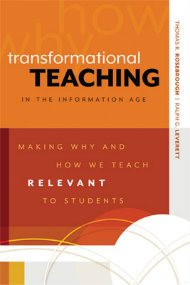Transformational Teaching
Transformational Teaching in the Information Age: Making Why and How We Teach Relevant to Students
By Thomas R. Rosebrough and Ralph G. Leverett
(ASCD, 2011 – Learn more)
One of the biggest challenges facing teachers today is to find ways to engage all of our students, especially those who seem to be more interested in being plugged in than in learning in traditional classroom settings. This book, Transformational Teaching in the Information Age, is an encouragement for teachers who are seeking to engage all of their students in this age of information overload.

Part of what I most appreciated about this book is that the authors maintain that the time we live in – the age of information overload – is not the enemy of good teaching. Our charge remains the same: to teach the whole student learner. We want to find ways to work with the information that is readily available to them (and to us) and not against it.
Insights into student engagement
The book is broken into two sections: Why We Teach: Relevant Concepts and How We Teach: Relevant Strategies. Each chapter also includes “take-away ideas” – well-marked sections that are thought provoking and include more explanations and ideas to reflect on. Transformational Teaching gives teachers a guide for realizing our main goal: not simply to transfer information from teacher to learner, but to ignite the fire of learning in our students. As teachers we want active, engaged students who are responsible for their own learning. We want our students to show the same kind of passion for their learning as they do for their iPods and cell phones. This book gives insight in how to accomplish this in our classrooms.
A practical guide by teachers who get it
As I was reading it, I felt like I was reading the words of educators who get it – who know what it’s like to be in the classroom. The authors are teachers and that comes through very clearly in their writing. This is not a theoretical or abstract book; it’s a practical guide for today’s teachers. These authors refer to some foundations of education – such as Piaget and Vygotsky – but also couch all of their work in the 21st century reality that we all face daily.
One of my favorite quotes from this book is this:
“…the best teachers practice a ‘controlled floundering’ where students are allowed to explore and discover but also to succeed and fail within a supportive, caring classroom environment. Without the experience of failing, students cannot know success.”
So much of today’s world involves instant access and instant knowing – if we don’t know the answer, we simply Google it (or ask Siri). But true learning isn’t just hearing “the right answer.” It’s asking and working and searching and striving and trying and yes, even failing. Those lessons that require deep participation on the part of our students are the ones that will stick as they move forward into a world of unlimited information and dizzying change.
For new teachers and veterans alike
I think this book should be required reading for teachers – both new and veteran. It affirms that while we are living in constantly changing times, the essence of what effective teachers do hasn’t changed. Teaching is still one of the world’s greatest – and most influential – professions. In our classrooms, we have the opportunity to educate students who will enter every possible walk of life. Having this book in my toolbox definitely gives me the extra push to be a teacher of intention in an often unintentional world.
Jenni Miller is a 6th grade Language Arts teacher at Montevideo Middle School in Penn Laird, Virginia. She has been teaching there for 19 years and absolutely loves reading and writing with her middle school students every day.































